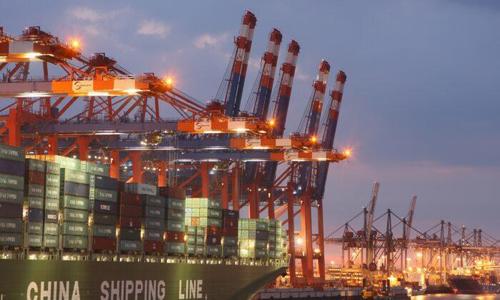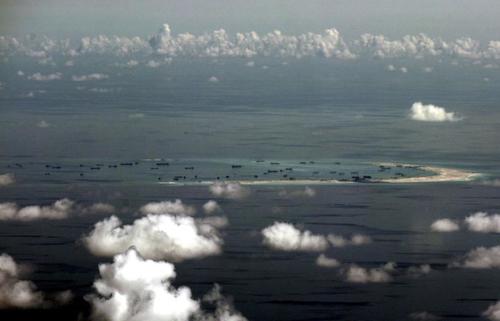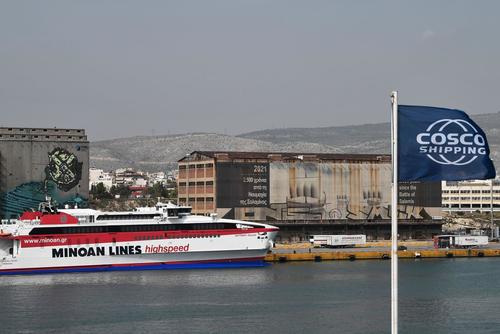Is Europe Changing Its Strategy Toward China?
Authored by June Teufel Dreyer via The Epoch Times,
The answer might be yes... and no. The European Parliament’s May 20 resolution freezing any consideration of a long-awaited Comprehensive Agreement on Investment (CAI) with China, along with advocacy of a strengthened European Union screening regulations on foreign investment and increased cooperation with the United States on a Transatlantic Dialogue on China, certainly seemed to symbolize a changed European attitude toward China.
A container ship from China Shipping Line is loaded at the main container port in Hamburg, Germany, on Aug. 13, 2007. Northern Germany, with its busy ports of Hamburg, Bremerhaven and Kiel, is a hub of international shipping. Hamburg is among Europe's largest ports. (Sean Gallup/Getty Images)
Undoubtedly, European leaders have become more wary than those who met with members of a visiting U.S. congressional commission two decades ago. Warned by commissioners against lifting an embargo on arms sales that had been passed after the massacre in Tiananmen Square, they replied stoutly and virtually in unison that China “is not the same country that it was in 1989.” They dismissed evidence that, although China was incontestably not the same country that it had been in 1989, it was in fact more repressive than it had been, and was getting more so.
Both Eurocrats and politicians seemed intrigued by the notion of strategic partnerships that China held forth, denying that they had any military implications, even when shown that the ideograph for the first character in strategic 戰略, shows a man holding a spear. Possibly their receptivity had something to do with Beijing’s hints at the prospect of lucrative deals for purchases of the wares of European defense contractors as well as the hordes of Chinese tourists eager to visit the continent’s castles, cathedrals, and department stores. Interestingly, the Western European states who had never lived under communism were the most trusting of Chinese promises whereas the Eastern European states, which had, were far more skeptical.
Fast forward twenty years and the picture changes dramatically. Not overnight, to be sure, but incrementally in rough proportion to increases in Chinese assertiveness. Enthusiasm for lifting the arms embargo waned after China’s National People’s Congress in 2005 passed an anti-secession law formally asserting Beijing’s determination to use non-peaceful means against the separation of Taiwan from China and in any scenario where unification [read: annexation] became otherwise impossible. So as well did China’s moves to enforce its claims to contested areas of the South China and East China seas as seen in its outright rejection of the 2016 ruling of the Permanent Court of Arbitration (PCA) that China’s nine-dash line had no basis in international law, and its willingness to use force, as it did against Vietnam in 2020. Revelations about the treatment of Muslim minorities in Xinjiang, and the steady diminution of the rights of residents of the Hong Kong Special Administrative Region that had been guaranteed under a 1984 treaty between Great Britain and China made it difficult to believe that Beijing cared about the rights of its peoples and international law. Or that post-1989 China was evolving toward the kind of liberal democratic state that European leaders had seemed so confident of.
An aerial photo taken though a glass window of a Philippine military plane shows the alleged on-going land reclamation by China on Mischief Reef in the Spratly Islands in the South China Sea, west of Palawan, Philippines, on May 11, 2015. (Ritchie B. Tongo/Pool/Reuters)
Reports on the suppression of religion and the persecution of believers were widely reported, but had few policy consequences. It was not so much that Europeans did not care about human rights issues as that they were eclipsed by concerns with the lure of a rapidly expanding Chinese market and their desire to get a larger share of it for themselves and their countries, often in competition with other European states.
There was no lack of awareness that China was negotiating with European countries one deal at a time, skillfully playing one against another, but also no consensus about what to do about it. French President Jacques Chirac declared 2004 the Year of China and bathed the Eiffel Tower in red for visiting counterpart Hu Jintao, with lucrative business deals signed during the latter’s four-day stay. And after German Chancellor Angela Merkel met with the Dalai Lama in 2007, she was criticized for jeopardizing German business opportunities in their rivalry with France.
Most European states welcomed Xi Jinping’s signature “One Belt, One Road” (OBOR, later renamed the “Belt and Road Initiative”) project that would facilitate Sino-European trade. Enthusiasm cooled markedly when it was discovered that too many of the railway cars that brought Chinese goods to Europe were being shipped back empty: a rueful quip was that OBOR should be renamed OBOW: One Belt One Way. In addition, it was noticed that European companies had slipped in global rankings even as Chinese companies like State Grid and Sinopec climbed into Fortune’s top ten.
With its 28, now 27, members, the European Union, finds it difficult to reach an agreement on most issues, let alone ones as contentious as dealing with China. Until the 2021 decision on CAI, the results tended to be tepid. Maritime law expert Peter Dutton deemed the EU statement on the PCA’s decision on the nine-dash line, a “deeply disappointing statement from a government that likes to consider itself one of humanity’s strongest supporters of international law. They could have … and should have … said they support the tribunal’s decision. Period.”
China was also able to take advantage of economic downturns in the Euro economy to acquire strategically important assets at low prices. China’s State Grid Corporation began acquiring stakes in the power networks of cash-strapped southern European countries, including Portugal, Spain, Greece, and Italy, raising concerns that Beijing might exercise control of their operations. In response to a query by Reuters, a State Grid official replied, “This is not a financial investment, [it’s] more like a strategic investment.”
When chided by the EU for allowing Chinese shipping company COSCO to acquire rights in Piraeus, Greek officials responded angrily that the EU had done little to help their country in its hour of need and that they would welcome more investment from China. COSCO now has a 67 percent stake in Piraeus, one of the largest ports in the Mediterranean and strategically situated close to the Suez Canal. The Chinese-Greek partnership has had consequences for EU decision-making, as when Greece refused to sign an EU letter on the South China Sea and, later, on China’s alleged torture of detained human rights lawyers. Hungary, where China had pledged to spend billions of dollars on a railway project, likewise declined to sign. Concerns grew that China could be targeting smaller countries with weaker economies in order to penetrate the region. And, when in 2012 China set up the 16 (later 17)+1 partnership with central and eastern European states, EU leaders fretted that this was a mechanism to try to divide Europe.
A view of old warehouses in the port of Piraeus which will be transformed to five-star hotels, on Oct. 18, 2018 – Chinese shipping giant Cosco said it has ambitious plans for the Greek port of Piraeus, including a boost on already-bustling container and car piers but also five-star hotel expansion. (Louisa Gouliamaki/AFP via Getty Images)
Chinese interests were not confined to penurious southern and eastern European states. German firms specializing in engineering and technology were prime targets for acquisition. In 2016, news that China’s Midea group planned to acquire cutting-edge robotics firm Kuka raised anxieties about loss of intellectual property. However, Chancellor Merkel declined to intervene, making Kuka essentially a Chinese company despite charges that German engineers were now designing robots for the People’s Liberation Army (Chinese military).
Vigilance, however, had been heightened. Shortly after the Kuka purchase, Germany’s economics ministry withdrew its earlier approval of chipmaker Aixtron by China’s Fujian Grand Chip Investment Fund LP, with Chinese officials accusing Germany of protectionism. Although German sources gave as their reason the lack of reciprocity in their dealings with China—which is true—the underlying issue was security. For example, Aixtron’s new, highly efficient semiconductor technology are able to boost the power of military radar transmitters while consuming less electricity. Not all concerns were economic: Berlin-based scholar journalist Didi Kirsten Tatlow’s meticulously documented study of China’s Einheitsfront (united front) operations, concluded that Beijing’s deliberate influencing in an orchestrated manner cannot be ignored, and that most Germans underestimate the CCP’s (Chinese Communist Party) will to power.
Similar revelations occurred in Britain bringing to an end what both sides called the “golden era” of bilateral relations, especially when, shortly after leaving office, former Prime Minister David Cameron accepted the headship of a fund to create new investment links between China and the UK. Security concerns were raised about Chinese participation in the UK’s Hinkley Point nuclear power station. News of the persecution of Uyghurs and the crackdown on pro-democracy Hong Kong residents deepened concerns, with Hong Kong being a particularly sensitive issue in Great Britain since it violated the 1984 treaty under which the UK agreed to return its colony to Chinese jurisdiction. These were exacerbated when the Chinese Foreign Ministry announced that the agreement “no longer has any practical significance and is not at all binding for the central government’s management over Hong Kong.”
Civil liberties not only in China but in the UK itself also began to be threatened with incidents such as Chinese students at the London School of Economics, likely acting on suggestions from their embassy, demanding that an LSE globe depicting Taiwan as separate from China be altered. The Chinese Embassy then threatened Oxford University’s Vice-chancellor Louise Richardson with the withdrawal of Chinese students unless she stopped Chancellor Chris Patten from visiting Hong Kong. Both efforts were unsuccessful: LSE’s globe remains unaltered and Richardson refused the embassy’s request. Patten subsequently said that “China had betrayed the people of Hong Kong and the West should cease kowtowing to Beijing for an illusory pot of gold.” And a February 2021 study of academic cooperation with Chinese entities found many UK universities “unintentionally generating research that is sponsored by China’s military conglomerates including those with activities in the production of weapons of mass destruction, intercontinental ballistic missiles, hypersonic missiles, and other items of massively destabilizing weaponry.”
Oxford University in Oxford, United Kingdom, on Sept. 20, 2016. (Carl Court/Getty Images)
Similarly high-handed statements from Chinese official sources occurred elsewhere. When meeting pushback, they tended to elicit insults. The ambassador to Sweden, reacting to its government’s complaints about the arrest of one of its nationals and, separately, evidence that an incident of Chinese tourists being bullied was fabricated, declared that his country had fine wines for its friends but shotguns for its enemies. Replying to widespread criticism of his words, the ambassador responded that Sweden was “not important enough to threaten.” After a French scholar defended the rights of parliamentarians to visit Taiwan, tweets from the Chinese embassy called him a “little hoodlum,” “ideological troll,” and “mad hyena.” When Lithuanian intelligence services accused China of increasingly aggressive espionage campaigns and the use of tech companies as surveillance assets, the Chinese ambassador countered that his country was being demonized and charged Lithuania with cold war-ism. Eighteen months later, Lithuania’s foreign minister announced his country’s withdrawal from the 17+ 1 organization and called on the other member states to do the same.
The EU’s tepid statement on Beijing’s rejection of the PCA ruling on the South China Sea did not diminish the concerns of nations with major shipping interests in the area. Britain and France announced plans to send naval vessels to emphasize the importance they attached to freedom of navigation in the area. France, which has geographically extensive territories in the South Pacific, was particularly articulate on this issue. After the ruling, then-defense minister Jean-Yves Le Drian called for joint EU patrols of the maritime areas of Asia and the establishment of a “regular and visible presence there” and, with China clearly in mind, Le Drian argued that if the rule of law and freedom of navigation were not respected in the South China Sea today, they will next be challenged in and around Europe. More surprising than the British and French FONOPs was Germany’s decision, although it has no territories in the area, to send a frigate to the area as part of a newly-adopted Indo-Pacific strategy.
What does this mean for the future of Sino-European relations? Unquestionably, attitudes in major EU countries have hardened. In Germany, the Green party’s candidate for chancellor, the Greens having a realistic chance to become the ruling party in the country’s September election, has vowed to be tough on China. The smaller Free Democratic Party, which has a reputation of being a kingmaker, has pointedly removed the “one-China” clause from its party platform. Britain has banned Chinese telecommunications provider Huawei from its 5G networks, offered UK passports to British National Overseas residents of Hong Kong, revoked state-owned broadcaster CGTN’s UK broadcast license, and expelled three Chinese for spying. In Czechia, attempts to build influence in politics backfired and there was discontent when a number of promised investments failed to materialize. The Czech senate president visited Taipei in defiance of Chinese orders and declared “I am Taiwanese;” Prague’s mayor publicly refused to accept a “one-China” clause and flies Tibetan flags from city hall.
Prague City Mayor Zdeněk Hřib talks to media about China during his visit to Taiwan on March 29, 2019. (Zdeněk Hřib, Mayor of Prague/Facebook)
Yet it would be foolish to overinterpret these events. China is defiant, with the Global Times editorializing that the conditions imposed for resuming the ratification process are “rough and arrogant,” that the sanctions imposed by China are actually countermeasures against the EU’s sanctions over Chinese officials and entities, and that there is no way that China will lift those sanctions under pressure from the European parliament. EU organizations other than the EP and many more European countries, the paper pointed out, want the CAI to come into force.
Global Times may well be correct. The CAI was, and presumably continues to be, a major priority for Chancellor Merkel because of China’s importance to the German automobile industry: if ratified, it would allow European companies to own majority stakes in their Chinese subsidiaries rather than forcing them to operate though joint venture with Chinese partners and share trade secrets. China is Germany’s largest trading partner.
In less wealthy countries, the lure of Chinese largesse is a powerful force for leaders even where there is opposition from the general public. Czech president Milos Zeman, who has been described as “ostentatiously pro-China,” has vowed to make his country China’s gateway to Europe, even welcoming Xi Jinping with a 21-gun salute—an honor not accorded to any foreign leader for more than fifty years. Most recently, he praised China as “the only country that helped us and sent medical supplies” in the pandemic. In Serbia, although complaints about the environmental and political aspects of Chinese investment grew, its elected leaders, despite their aspiration to join the EU and claims to share its democratic values, lean further toward China, which offers big loans, vaccines, and investments without the constraints that the EU would impose. Mutatis mutandis, there is a similar situation in Montenegro, whose government has asked Brussels for financial assistance to refinance a loan to China for an expensive only partially built highway that, according to European analysts, was a risky proposition to start with. China holds a quarter of Montenegro’s debt; if it defaults, the terms of the contract give China the right to access the country’s land as collateral.
It is also possible that the EU sanctions themselves may end up hurting Western companies as much or more than China. Beijing has imposed boycotts on companies such as Sweden’s H&M, among others, for its “suicidal” remarks on so-called slave labor in Xinjiang, thereby impacting an important market for the apparel maker. A Xinjiang factory manager, admitting an initial downturn in international purchases of cotton, stated that his factory had made up the difference by shifting to domestic orders.
In sum, European strategy toward China has evolved beyond the so-called golden years, and present tensions are unlikely to abate in the foreseeable future. With the emotional naivete of the past now spent, European statespersons would do well to concentrate on the realistic economic and security aspects of the relationship. Given the democratic principles that undergird both Eurogovernance and those of Europe’s component states, Beijing will always have the upper hand in playing one off against another. How long this can continue depends on many factors outside the scope of this study. Meanwhile, however, the EU’s dream of a partnership between a united Europe and a liberalizing China seems to have fallen victim to Xi Jinping’s China Dream.
https://ift.tt/3yLFlFC
from ZeroHedge News https://ift.tt/3yLFlFC
via IFTTT









0 comments
Post a Comment